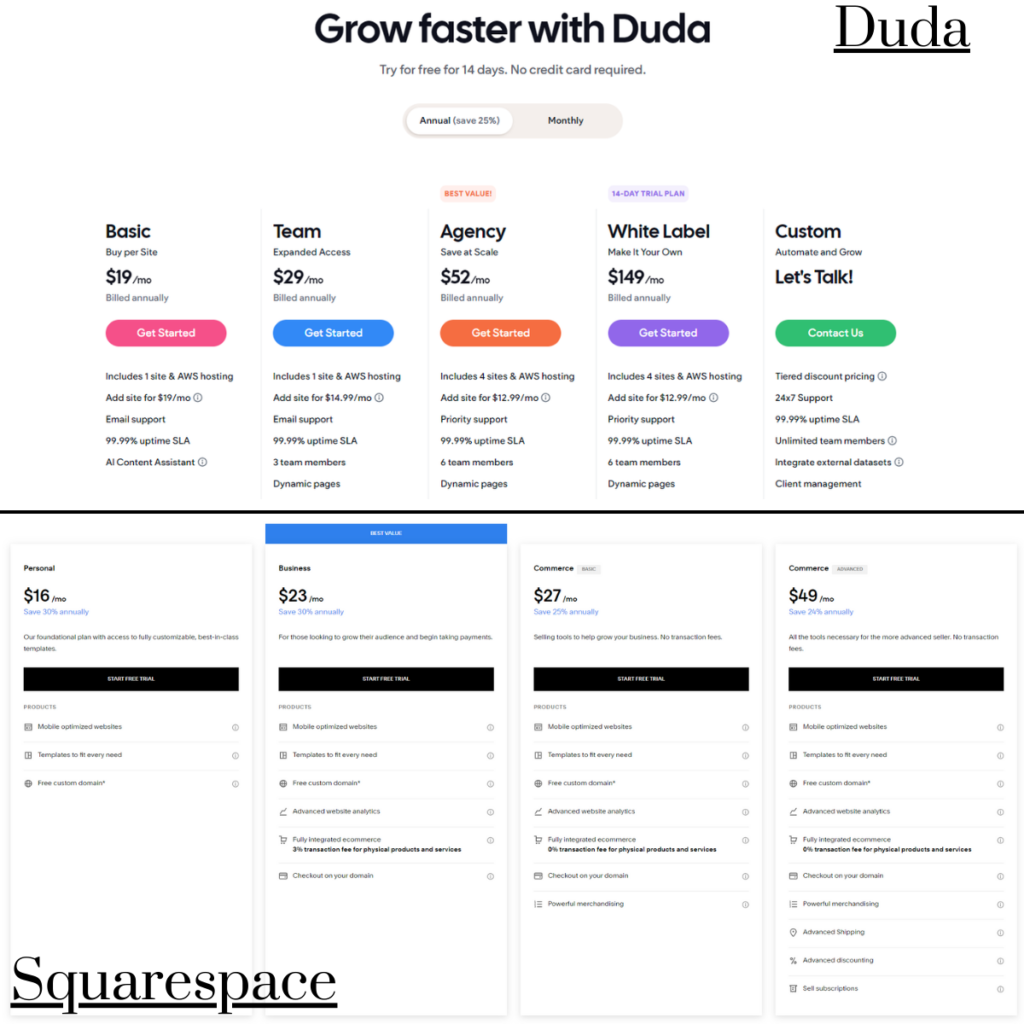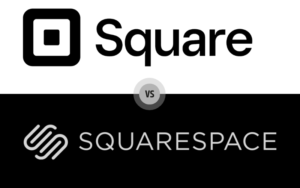In the debate of Duda vs Squarespace for website building, we analyze their features, strengths, weaknesses, and unique selling points. This comprehensive comparison helps professionals, small business owners, and creative individuals choose the right platform based on their website goals. We cover aspects such as ease of use, design capabilities, pricing, and customer support to assist in making an informed decision.
Table of Contents
Background of Duda and Squarespace
When delving into the “Duda vs Squarespace” comparison, understanding the background and core philosophy of each platform provides essential context.
Duda: Founded in 2009, Duda started as a platform focused on making websites mobile-friendly. Over the years, it has evolved into a comprehensive web design platform aimed at professionals, agencies, and larger enterprises. Duda is known for its emphasis on collaboration and efficiency, offering tools that facilitate rapid website development and client management. The platform stands out for its focus on enabling web professionals to quickly build highly customizable, responsive websites that cater to specific customer needs.
Squarespace: Squarespace, established in 2003, began with a mission to simplify the creation of elegant, professional-quality websites for individuals and small businesses. It has since grown into one of the leading website builders, known for its sleek designs and intuitive drag-and-drop interface. Squarespace is especially popular among creatives, small business owners, and entrepreneurs who seek a balance of simplicity, design, and functionality. The platform prides itself on being a one-stop-shop for building, hosting, and managing aesthetically pleasing websites.
Comparing Backgrounds: In comparing “Duda vs Squarespace,” we see two platforms that, while serving the broader website creation market, have distinct focuses and target audiences. Duda is tailored more towards web professionals and agencies looking for efficiency and customization in web design, while Squarespace appeals to individual users and small businesses who prioritize ease of use and design aesthetics.

Understanding these backgrounds is key to appreciating the different approaches Duda and Squarespace take in website building, setting the stage for a more in-depth comparison of their specific features and capabilities.
Ease of Use
In the “Duda vs Squarespace” comparison, ease of use is a critical factor that often influences a user’s choice, especially for those who are not technically skilled in web development.
Duda: Duda is designed with a focus on efficiency and collaboration, which is particularly appealing to web design professionals and agencies. Its interface is streamlined for rapid design and deployment of websites. Features like drag-and-drop functionality, customizable templates, and an extensive library of widgets make the process of website building both efficient and flexible. However, it’s worth noting that while Duda is user-friendly, its wide array of advanced options might initially overwhelm beginners or solo users who prefer a more straightforward approach.
Squarespace: Squarespace is renowned for its user-friendly interface, making it a popular choice among individuals, small business owners, and creatives with little to no web development experience. The platform offers a highly intuitive drag-and-drop builder, elegant templates, and simple customization options, allowing users to create beautiful websites with minimal effort. Squarespace’s ease of use does not compromise the quality of design, providing a perfect balance for users who value both simplicity and aesthetics.
Ease of Use Comparison: When comparing “Duda vs Squarespace” for ease of use, Squarespace stands out for its simplicity and user-friendly design, ideal for beginners and those who prefer a more guided approach. Duda, while also user-friendly, offers more advanced features and customization options, catering to users with some experience in web design or those who require more sophisticated websites.
In summary, both Duda and Squarespace excel in ease of use, but they cater to different user bases. Squarespace is ideal for those seeking simplicity and elegant design, while Duda is more suited for professional designers and agencies that require a higher degree of customization and efficiency.
Website Design and Customization
The aspect of website design and customization is a crucial point of comparison in the “Duda vs Squarespace” debate, as it determines how much control and creative freedom users have over their website’s appearance and functionality.
Duda: Duda is highly regarded for its extensive customization capabilities. It offers a wide range of templates that are not only responsive but also customizable down to minute details. This flexibility is particularly beneficial for web designers and agencies that need to create unique, brand-specific websites for their clients. Duda allows for deep customization, including editing HTML and CSS, which is a significant advantage for those with technical expertise. Additionally, Duda’s widget builder and the ability to save customized sections for reuse enhance efficiency in designing multiple websites.
Squarespace: Squarespace is known for its elegant, professionally designed templates, which are a key selling point of the platform. These templates are not only visually appealing but also highly functional, with a focus on design-forward features. While Squarespace offers less granular control over customization compared to Duda, it provides a balanced approach that is sufficient for most users, especially those without web design experience. Customization in Squarespace is straightforward, with easy-to-use settings for adjusting layouts, colors, fonts, and other design elements.
Comparison in Design and Customization: When weighing “Duda vs Squarespace” in terms of design and customization, Duda stands out for its advanced customization options suitable for professional web designers, while Squarespace offers beautifully designed templates with a level of customization that caters well to beginners and those looking for a seamless design experience.

In conclusion, both Duda and Squarespace excel in website design and customization but cater to different user needs. Duda offers more in-depth customization suited for professionals, whereas Squarespace provides an ideal balance of beautiful design and user-friendly customization for beginners and intermediate users.
E-commerce Features
In the “Duda vs Squarespace” comparison, the e-commerce capabilities of each platform are crucial for businesses looking to establish or expand their online stores.
Duda: Duda offers a range of e-commerce features, though it is generally considered more suitable for small to medium-sized online stores. The platform enables users to add an online store to their website with ease, providing essential functionalities like product listing, inventory management, and secure payment options. Duda supports various payment gateways and offers features such as coupon codes and promotional pricing. However, its e-commerce capabilities might not be as extensive as some dedicated e-commerce platforms, making it more suitable for businesses with simpler online selling needs.
Squarespace: Squarespace is highly praised for its e-commerce integration, making it a strong contender for businesses focusing on online sales. The platform offers a comprehensive set of e-commerce tools, including unlimited product uploads, detailed product descriptions, inventory tracking, and various shipping options. Squarespace also provides advanced features like abandoned cart recovery, which helps in increasing conversion rates. Its seamless integration of e-commerce functionalities with aesthetically designed templates makes Squarespace a preferred choice for businesses that prioritize both functionality and design in their online store.
Comparison of E-commerce Features: When considering “Duda vs Squarespace” for e-commerce, Squarespace generally offers a more robust set of tools and features, ideal for businesses that are heavily focused on e-commerce. Duda, while capable of supporting e-commerce activities, is better suited for websites where online selling is not the primary focus.
In summary, both Duda and Squarespace offer e-commerce functionalities, but Squarespace stands out for its comprehensive and integrated e-commerce features, making it a better choice for businesses that are primarily focused on online selling.
SEO and Marketing Tools
In the context of “Duda vs Squarespace,” understanding how each platform supports SEO and marketing efforts is essential for businesses looking to enhance their online visibility and reach.
Duda: Duda provides a solid range of SEO features designed to help websites rank higher in search engine results. These tools include customizable meta tags, alt tags for images, and mobile-responsive design, which is crucial for SEO. Duda also offers advanced features like multilingual site support and the ability to customize URLs, which can be beneficial for targeting different regions and languages. However, Duda’s SEO capabilities might require a bit more manual input and understanding of SEO best practices compared to more automated solutions.
Squarespace: Squarespace is known for its strong SEO capabilities, offering a suite of tools that cater to both beginners and advanced users. The platform automatically generates sitemaps and uses clean HTML markup to enhance search engine indexing. Squarespace also allows for easy editing of page titles, meta descriptions, and custom URLs. Additionally, its integration with social media platforms and built-in analytics tools aid in broader marketing efforts, providing insights into website performance and visitor engagement.
Comparison of SEO and Marketing Tools: When comparing “Duda vs Squarespace” in terms of SEO and marketing tools, Squarespace tends to be more user-friendly, offering more automated SEO features suitable for users who may not have in-depth SEO knowledge. Duda, while offering comprehensive SEO tools, might be better suited for users who have a bit more experience with SEO and are willing to delve into more manual optimizations.

In summary, both Duda and Squarespace provide valuable SEO and marketing tools, but Squarespace’s more automated approach may be more appealing to those with less SEO experience, while Duda offers more control for those with a deeper understanding of SEO practices.
Mobile Responsiveness
In today’s mobile-first world, examining the mobile responsiveness of website builders is a crucial aspect of the “Duda vs Squarespace” comparison. Ensuring that websites perform and look great on mobile devices is vital for reaching a wider audience and improving search engine rankings.
Duda: Duda is highly recognized for its focus on mobile responsiveness. From its inception, Duda has emphasized the importance of mobile-friendly websites. It offers automatic conversion of desktop sites to mobile-friendly versions, ensuring that all elements resize and reposition correctly on smaller screens. Additionally, Duda allows for the customization of mobile site layouts, giving users the flexibility to create unique experiences for mobile users. This attention to mobile design is especially advantageous for businesses that prioritize reaching customers on smartphones and tablets.
Squarespace: Squarespace also excels in creating mobile-responsive websites. All Squarespace templates are designed to be fully responsive, meaning they automatically adjust to fit the screen size of any device, whether it’s a desktop, tablet, or smartphone. The platform’s design interface lets users preview and adjust how their site will appear on different devices, ensuring a consistent and optimal user experience across all platforms. Squarespace’s approach to mobile responsiveness is both user-friendly and effective, making it a strong choice for those who want a seamless mobile presence without the need for extensive customization.
Comparison in Mobile Responsiveness: When comparing “Duda vs Squarespace” in terms of mobile responsiveness, both platforms offer robust solutions. Duda provides more control over the mobile-specific layout, which can be a significant advantage for users who wish to tailor their mobile site extensively. Squarespace, on the other hand, ensures that all templates are inherently mobile-responsive, offering a hassle-free approach to mobile optimization.

In conclusion, Duda and Squarespace both recognize the importance of mobile responsiveness and offer effective solutions. The choice between them may come down to the level of customization desired for the mobile version of your website.
Integrations and Plugins
Exploring the range and utility of integrations and plugins is a key element in the “Duda vs Squarespace” comparison, as these features can significantly expand and enhance the functionality of a website.
Duda: Duda stands out for its extensive range of integrations and plugins, catering particularly to the needs of web professionals and agencies. The platform offers a variety of third-party integrations, including tools for analytics, marketing, e-commerce, and social media. One of Duda’s notable features is its widget builder, which allows users to create and add custom widgets to their sites, offering a high degree of customization. This flexibility is particularly beneficial for users who require specific functionalities to meet the unique needs of their business or their clients.
Squarespace: Squarespace also offers a selection of integrations and plugins, although the range is not as extensive as Duda’s. These integrations are primarily focused on enhancing the website’s core functionalities in areas like e-commerce, social media, and SEO. Squarespace’s approach to integrations is more about providing seamless, built-in features rather than a wide array of external add-ons. While this might limit some advanced customization options, it ensures that the integrated tools are highly cohesive and maintain the platform’s ease of use and design aesthetics.
Comparison of Integrations and Plugins: In comparing “Duda vs Squarespace” for integrations and plugins, Duda offers a broader selection and more flexibility, which is ideal for users who need to integrate various third-party tools or create custom functionalities. Squarespace, while having fewer options, provides a more streamlined and integrated experience, which can be beneficial for users who prefer simplicity and ease of use.
In summary, both Duda and Squarespace offer valuable integrations and plugins, but they cater to different user preferences. Duda is more suitable for users seeking extensive customization options through a wide range of integrations, while Squarespace is ideal for those who prefer a more integrated and straightforward approach.
Analytics and Reporting
In the “Duda vs Squarespace” comparison, analytics and reporting capabilities are essential for understanding website performance and making data-driven decisions.
Duda: Duda offers comprehensive analytics and reporting tools that allow users to monitor various aspects of their website’s performance. This includes tracking visitor behavior, analyzing traffic sources, and understanding engagement patterns. Duda’s platform integrates with Google Analytics for a more in-depth analysis, providing users with valuable insights into their website’s performance. Additionally, Duda’s dashboard presents key metrics in an easily digestible format, making it simple for users to access and interpret their data. This feature is particularly useful for agencies and professionals who need to report back to clients with detailed analytics.
Squarespace: Squarespace also provides robust analytics and reporting features. Its built-in analytics tools offer a range of data, from basic traffic statistics to more advanced insights like conversion rates, sales data, and visitor demographics. Squarespace’s analytics are designed to be user-friendly, offering clear and visually engaging reporting that can be easily understood even by those without a technical background. This integration of analytics into the platform allows for a seamless user experience, without the need for external analytics services.
Comparison of Analytics and Reporting: When comparing “Duda vs Squarespace” for analytics and reporting, both platforms offer strong capabilities, but with different approaches. Duda’s integration with Google Analytics might appeal more to users who are accustomed to Google’s extensive data analysis tools, while Squarespace’s built-in analytics provide a more streamlined, user-friendly approach for website owners who prefer an all-in-one solution.

In summary, Duda and Squarespace both provide comprehensive analytics and reporting tools, with Duda offering more integration with external tools like Google Analytics, and Squarespace providing a more integrated, straightforward analytics experience within its platform.
Performance and Speed
Evaluating performance and speed is a vital aspect of the “Duda vs Squarespace” comparison, as these factors directly impact user experience and search engine rankings.
Duda: Duda is known for its high-performance websites, with a strong focus on speed and reliability. The platform utilizes advanced technologies to ensure that websites load quickly and run smoothly. This is particularly important for mobile users, where speed is a critical factor in user engagement. Duda’s infrastructure is optimized for fast content delivery, minimizing the time it takes for pages to load. This commitment to performance is a significant advantage for businesses that prioritize user experience and seek to maintain high search engine rankings.
Squarespace: Squarespace also places a high emphasis on website performance and speed. The platform is designed to automatically optimize website content for fast loading times, which includes image optimization and efficient coding practices. Squarespace’s servers are robust, ensuring reliable uptime and consistent performance. However, due to the high level of design customization and rich media content that Squarespace supports, some users might experience slightly slower loading times, particularly on more complex sites.
Comparison of Performance and Speed: In comparing “Duda vs Squarespace,” both platforms demonstrate strong capabilities in website performance and speed. Duda might have a slight edge in terms of loading speed, especially for mobile users, due to its focused optimization technologies. Squarespace, while offering reliable performance, may vary slightly based on the design complexity and content richness of the site.
In summary, both Duda and Squarespace are committed to providing high-performing, speedy websites. The choice between the two may depend on the specific performance needs of your website and the balance between design complexity and speed optimization.
Pricing and Plans
A critical aspect of the “Duda vs Squarespace” comparison is the pricing and plans offered by each platform. Understanding the cost and what each plan includes is essential for businesses to make an informed decision.
Duda: Duda offers a tiered pricing structure, designed to cater to different user needs, from freelancers to large agencies. The pricing tiers typically start with a basic plan suitable for individuals or small businesses, scaling up to more advanced plans that offer additional features like team collaboration tools, more extensive site widgets, and white-label options for client management. Duda’s higher-tier plans are particularly tailored for web design professionals and agencies that require advanced functionalities. While Duda might be on the higher end of the pricing spectrum compared to some competitors, its extensive features and focus on professional-grade website building justify the cost for its target audience.
Squarespace: Squarespace’s pricing is also structured in tiers, ranging from basic to advanced plans. The basic plan is ideal for individuals looking to create a simple, aesthetically pleasing website, while the higher tiers offer more comprehensive e-commerce features, marketing tools, and increased customization capabilities. Squarespace’s plans are generally considered to offer good value for the price, especially for users who prioritize design and ease of use. The platform also offers a free trial period, allowing users to test its features before committing to a subscription.
Comparison of Pricing and Plans: When comparing “Duda vs Squarespace” in terms of pricing, the choice depends on the specific needs and budget of the user. Duda’s plans, while more expensive, offer advanced features and customization options suited for professional web designers and agencies. Squarespace, on the other hand, provides a more affordable solution for individuals and small businesses who need an easy-to-use platform with great design options.

In summary, both Duda and Squarespace offer a range of pricing options to suit various users, from individuals to large businesses. The decision on which platform to choose should be based on the specific functionalities required and the budget allocated for website development and maintenance.
Customer Support
Examining customer support is an essential aspect of the “Duda vs Squarespace” comparison, as effective support can significantly enhance user experience and satisfaction.
Duda: Duda is recognized for its high level of customer support, particularly catering to the needs of agencies and professionals. The platform offers various channels for support, including email, phone, and a comprehensive knowledge base. For higher-tier plan subscribers, Duda provides priority support, which can be crucial for businesses that need immediate assistance. Additionally, Duda’s resource center includes webinars, guides, and a community forum, offering users multiple ways to find solutions and learn best practices. This strong support network is a significant advantage for users who require regular assistance or have complex queries.
Squarespace: Squarespace also offers robust customer support, characterized by its 24/7 email response team and live chat support during business hours. While Squarespace does not offer phone support, its extensive online help center is packed with detailed articles, step-by-step guides, and video tutorials. These resources are designed to help users troubleshoot issues independently and make the most out of the platform. Squarespace’s focus on comprehensive online support resources is particularly beneficial for users who prefer self-service options.
Comparison of Customer Support: When comparing “Duda vs Squarespace” in terms of customer support, both platforms offer strong support systems, but with different approaches. Duda’s provision of phone support and priority options is ideal for professional users who may require more direct and immediate assistance. Squarespace, with its extensive online resources, caters well to users who are comfortable with self-guided learning and online troubleshooting.

In conclusion, both Duda and Squarespace provide effective customer support, with Duda offering more direct channels like phone support, and Squarespace focusing on comprehensive online resources and responsive chat support.
User Reviews and Community Feedback
Exploring user reviews and community feedback is an important part of understanding the “Duda vs Squarespace” comparison from a real-world perspective. This feedback can provide insights into how each platform performs in practical scenarios and highlight any common issues or notable strengths.
Duda: User reviews for Duda often emphasize its powerful customization capabilities and efficiency, making it a favorite among web design professionals and agencies. Users appreciate the platform’s advanced features and flexibility, which allow for the creation of unique, high-quality websites. However, some reviews point out that Duda’s more complex features can have a steeper learning curve, particularly for beginners or those not requiring advanced functionalities. The feedback from the professional community also highlights the effectiveness of Duda’s customer support, especially for higher-tier plan subscribers.
Squarespace: Squarespace generally receives positive feedback for its ease of use and beautifully designed templates. Users frequently praise the platform for allowing them to create aesthetically pleasing websites without needing extensive design or technical skills. The intuitive drag-and-drop interface is often highlighted as a key benefit. On the downside, some users mention limitations in customization options and a desire for more advanced features. The Squarespace community also often discusses the platform’s reliable customer support and comprehensive self-help resources.
Comparison of User Reviews and Community Feedback: When comparing “Duda vs Squarespace” based on user reviews and community feedback, it’s evident that each platform caters well to its target audience. Duda is highly regarded by web design professionals for its customization and efficiency, while Squarespace is favored by individuals and small businesses for its ease of use and design quality.
In conclusion, user reviews and community feedback reveal that both Duda and Squarespace excel in their respective niches – Duda as a customizable platform for professionals and Squarespace as a user-friendly solution for beautiful website design.
Pros and Cons
In weighing the advantages and drawbacks of “Duda vs Squarespace,” it’s important to have a clear and concise overview of the pros and cons of each platform. This comparison helps in making an informed decision based on specific needs and preferences.

Duda: Pros and Cons
Pros:
- Advanced Customization: Duda is highly praised for its extensive customization options, appealing to web designers and professionals.
- Efficiency for Professionals: With features like team collaboration and client management, it’s well-suited for agencies and large teams.
- Widget Builder: Allows creating and adding custom widgets, offering unique functionalities for websites.
- Robust Customer Support: Particularly for higher-tier plans, including phone support and prioritized assistance.
Cons:
- Steep Learning Curve: The platform can be overwhelming for beginners due to its advanced features.
- Higher Cost: Duda’s pricing might be a bit steep compared to other platforms, particularly for small businesses or individual users.
- Less Ideal for Simple Websites: May offer more features than needed for users seeking basic website functionality.
Squarespace: Pros and Cons
Pros:
- Ease of Use: Known for its user-friendly interface, ideal for beginners and those with no technical background.
- Elegant Design Templates: Offers a range of beautifully designed templates that are both professional and customizable.
- Integrated E-commerce and SEO Tools: Provides comprehensive tools for online stores and optimizing websites for search engines.
- All-in-One Solution: Squarespace is a one-stop-shop for building, hosting, and managing a website.
Cons:
- Limited Customization: While it offers good design options, the customization capabilities are not as extensive as Duda’s.
- No Phone Support: Lacks direct phone support, which may be a drawback for users who prefer speaking to support staff.
- Can Be Pricey for Full Features: To access all advanced features, especially for e-commerce, higher-tier plans are required.
In summary, both Duda and Squarespace have their respective strengths and weaknesses. Duda offers advanced features and customization suited for professionals, while Squarespace shines with its ease of use and design-focused approach, making it ideal for individuals and small businesses.
Conclusion
As we conclude our in-depth comparison of “Duda vs Squarespace,” it’s clear that both platforms offer distinct features and cater to different user needs in the website building landscape.
Duda emerges as a powerful choice for professional web designers and agencies looking for a high degree of customization, efficiency in design, and collaboration tools. Its advanced features and widget-building capabilities make it ideal for creating unique, sophisticated websites, especially for clients requiring specific functionalities.
On the other hand, Squarespace stands out as an excellent option for individuals, creatives, and small business owners who prioritize ease of use, elegant design, and an all-in-one solution for their website needs. Its user-friendly interface, stunning templates, and comprehensive set of integrated tools make website building a seamless and enjoyable experience.
The decision between Duda and Squarespace ultimately hinges on your specific requirements. If your priority is having a platform that offers advanced customization and professional-grade tools, Duda is the way to go. However, if you’re looking for a platform that combines simplicity, beautiful design, and effective all-round functionality, Squarespace is the ideal choice.
In summary, both Duda and Squarespace are competent in their realms. Your selection should align with your technical expertise, design needs, and the specific functionalities you desire for your website. By carefully considering these factors, you can choose the platform that not only meets your current needs but also supports the growth and evolution of your online presence.





Pingback: The Ultimate Squarespace Review 2024: Is It Still the Top Choice for Website Builders? - Flannery Reviews
Pingback: Duda Review - Comprehensive Analysis for 2024 - Flannery Reviews
Pingback: Is Duda a Good Website Builder? - Choosing the Best Website Builder for 2024 - Flannery Reviews